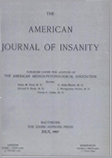HYPERTHYROIDISM AND PSYCHOBIOLOGICAL REACTIONS
Abstract
An attempt was made to estimate the significance of more or less marked hyperthyroidism in 70 psychoneurotic and psychotic patients. Two problems were discussed: (a) The rôle of hyperthyroidism in the etiology and pathogenesis of psychoses; (b) The correlation between psychobiological reactions, dysfunction of the autonomic nervous system, and hyperthyroid function. Our material suggests the following:
1. Hyperthyroidism may coincide with various types of actual psychoses; thyrotoxicosis is apt to cause mental reactions which are not essentially different from those commonly present in many other toxic and infectious conditions.
2. In some of our psychotic patients the hyperthyroid function appeared to play a rôle as a causative, precipitating, or aggravating factor. In other patients, hyperthyroidism did not seem to have any bearing on the origin, course, and recurrence of various types of psychoses.
3. Studies of life histories of patients, having symptoms of dysfunction of the autonomic nervous system and of hyperthyroidism, bring out the presence of more or less serious psychobiological implications. Such studies strongly suggest, first, that there is a close interrelationship between the psychobiological implications and the malfunction of both the thyroid gland and the autonomic nervous system; second, that these pathologic manifestations have a common origin which may be traced to a combination of personality background (including a predisposition to hyperthyroidism) and injurious situational conditions.
4. In the discussion of the differential diagnosis between dysfunction of the autonomic nervous system and hyperthyroidism, it was pointed out that both persistent tachycardia and high basal metabolic rate, considered to be characteristic of hyperthyroidism, may also be present in conditions in which the dysfunction of the autonomic nervous system appears to be the essential factor.
5. Granting that hyperthyroidism is not exclusively a thyroidal disease, its treatment in every case necessitates a consideration of medical and psychiatric aspects before surgical intervention is considered.
6. Thyroidectomy is regarded as a treatment measure which may or may not have an influence on the general personality background; it, therefore, should always be supplemented by treatment of the patient's total personality and the situation in which hyperthyroidism has developed.
Access content
To read the fulltext, please use one of the options below to sign in or purchase access.- Personal login
- Institutional Login
- Sign in via OpenAthens
- Register for access
-
Please login/register if you wish to pair your device and check access availability.
Not a subscriber?
PsychiatryOnline subscription options offer access to the DSM-5 library, books, journals, CME, and patient resources. This all-in-one virtual library provides psychiatrists and mental health professionals with key resources for diagnosis, treatment, research, and professional development.
Need more help? PsychiatryOnline Customer Service may be reached by emailing [email protected] or by calling 800-368-5777 (in the U.S.) or 703-907-7322 (outside the U.S.).



